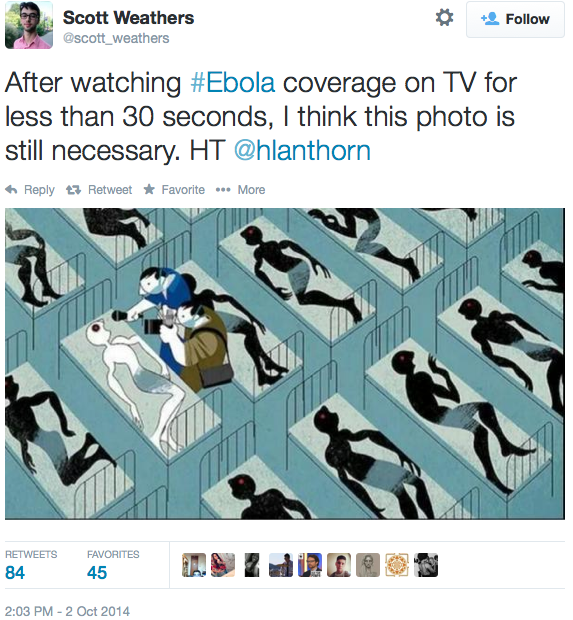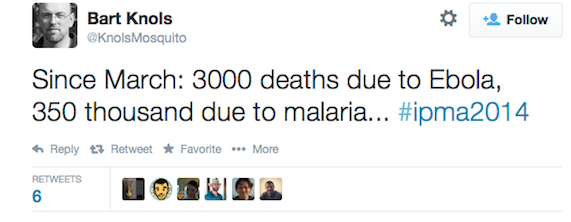Gathering
Share one thing that has stood out for you about reporting on the Ebola outbreak since a Liberian man infected with the disease died in Dallas.
If you did the earlier lesson plan on Ebola, consider asking instead:
Share one thing that has stood out for you about Ebola reporting since we last met to talk about the outbreak of the disease.
Ideal World?
Ask a volunteer or two to read the following excerpt from the Washington Post
[The panic that followed the announcement of the first confirmed case of Ebola in the U.S.] is understandable but unnecessary. Ebola has a worryingly high mortality rate, and its spread in West Africa, most notably in Liberia, Sierra Leone and Guinea, has been unprecedented, but for a person to contract Ebola, they need direct contact with an infected person's blood, vomit or feces during the contagious period. The U.S. healthcare system is well-prepared to isolate and treat the infected person before they have a chance to infect others, limiting the risk of a large-scale outbreak.
In an ideal world, America's Ebola panic will come with a silver lining: a recognition that Ebola is a truly global problem, and protecting the health of Americans will probably start by saving the lives of thousands of people in West Africa.
Debrief questions to consider:
- What is the "ideal world," according to this excerpt?
- What do you think about that in light of diversity and equality?
- What is the "silver lining" about America’s Ebola panic, according to this excerpt?
- What do you think about the idea that only worries about Ebola infecting Americans will spur interest in saving the lives of thousands of people in West Africa?
- Does this represent an ideal world? Explain.
- Does this represent a real world? Explain.
Small group discussion:
Disease and the Media
Ask students to read quietly by themselves, the following excerpt from the Huffington Post. Then in small groups discuss the questions below:
"Epidemics on the other side of the world are a threat to us all. No epidemic is just local." Peter Pilot, Director, London School of Hygiene & Tropical Medicine
Ebola was most fervently declared a global epidemic the moment it touched down in Dallas, Texas. It's a scary word with a scary history and with the media pulsing it in our faces 24-hours-a-day our fear continues to intensify. And yet here's the spread breakdown according to Dan Diamond over at Forbes:
- Liberia Deaths: 1830
- Guinea Deaths: 648
- Sierra Leone Deaths: 605
- Nigeria Deaths: 8
- United States Deaths: [1]
Sure, the fear isn't so much of the present but of the "what if" and of the "potential" for mass (Western) casualties. So USAID and the Department of Defense and a host of other US-based organizations are strapping up and wading through the worst Ebola-stricken areas for the noble sake of ending its devastating impact on humanity. Or is it for the sake of protecting ourselves? Does intent even matter?
In their small groups ask students to discuss the questions raised in this excerpt:
- Are US (and European) organizations going to Ebola-stricken areas for the "noble sake of ending its devastating impact on humanity" or are they going to protect themselves?
- Does intent matter? Why?
Back in the large group, ask some volunteers to share what they discussed in their small groups by asking the following questions:
- What were some of the things that you discussed in your small groups?
- What did you agree on? What did you disagree on?
- How did your group feel about the Western response to Ebola in Africa? Explain.
Next project Tweet #1 below onto the smart board or print it out for students to see:
Tweet #1 by Scott Weathers:

Discuss in small groups:
- What is this cartoon trying to say about Ebola?
- Why does Scott Weathers think this photo is still necessary?
- Why does he use the word "still"?
- What are your thoughts about this?
- How does this tie into what you’ve discussed in your small groups so far?
Next, project Tweet #2 onto the smart board or print it out for students to see:
Tweet #2 by Bart Knols:

Discuss in small groups:
- What is this Knols trying to say about Malaria?
- What are your thoughts about this?
- How does this tie into what you’ve discussed in your small groups so far?
The History of Tropical Medicine
Ask another volunteer or read out the following excerpt from the Huffington Post. Then in small groups discuss the questions below:
Without diving too much into history, this is essentially how our modern efforts to eradicate malaria began. Western researchers, many of whom wanted to exploit African countries in one way or another, kept getting sick and even dying from malaria. In order to be exploitative, they had to first be healthy. So began some of our most comprehensive anti-malaria campaigns. We learned much about the disease and this knowledge has helped those most afflicted, but the intention was clear: to look out for No 1.
Professor John Farley, author of Bilharzia, spoke bluntly of this:
"Tropical medicine from 1898 to the 1970s was fundamentally imperialistic in its basic assumptions, its methods, its goals, and its priorities."
Are we becoming increasingly aware of... our global interconnectedness? Philosopher Roman Krznaric seems to think so, yet he also sees the modern forces at play in our age of ... "... hyper-individualism, where a barrage of free-market thinking, advertising propaganda and simplistic self-help is telling us we should busy ourselves with looking after No 1."
His answer? "Empathy is the antidote we need to create a world where we embrace a philosophy of 'You are, therefore I am.'"
Discuss in the full group:
- What are your thoughts and feelings about this excerpt?
- According to this excerpt what motivated people to eradicate malaria during the colonial era?
- How have things changed since the colonial era?
- How does this relate to the quote we read earlier in the lesson by Peter Pilot, Director of the London School of Hygiene & Tropical Medicine?: "Epidemics on the other side of the world are a threat to us all. No epidemic is just local."
- How role does empathy play in all this, according to Roman Krznaric?
Closing
Do a go-round, asking students to share one word about today’s lesson. Or, if very little time remains, ask students on the count of three to give today’s lesson a thumbs up, down or in between.
If you have time for a more interactive approach, ask students to rate the lesson from 1 to 5, where 1 means "not interesting" and/or "I didn’t learn anything," and 5 means "very interesting" and/or "I learned a lot." Invite students to stand up if they consider the lesson a 1, and invite volunteers to share why. Then continue with each number up to 5.
EXTENSION MATERIALS on interconnectedness and empathy
VIDEO - The Burial Boys of Ebola
After viewing the video, ask students to break into groups of 4-5 and discuss the questions below. Then open things up to the larger group, asking volunteers from the smaller groups to share some of what was discussed in the smaller groups.
Questions for small- and large-group discussion
- What are your thoughts and feelings about this clip?
- Who are the burial boys of Sierra Leone?
- What does a day in the life of the burial boys look like?
- How are the burial boys treated by the communities they go into?
- What are your thoughts and feelings about that?
- How do the burial boys feel about their work? What do you think about this?
ARTICLE - Plagues on the Poor: What Ebola Can Learn From Malaria
By Karen M. Masterson, October 2, 2014
Ask students to read the article. Then discuss the following questions:
- What are your thoughts and feelings about this article?
- What is the primary message the author is trying to send?
- What does the author say about how the U.S. spends the money it has committed to global health programs targeting infectious diseases?
- How does this relate to the spread of Ebola?
- How does this article relate to the excerpts from the Huffington Post we discussed earlier in this lesson?
- The article talks about Ebola as "the latest plague on impoverished people." It refers to how the disease spreads quickly in places where people lack basic health care. How does this relate to the main argument the author tries to make?
PHOTOGRAPHS/SLIDESHOW - Braving Ebola
Photographs and Interviews by Daniel Berehulak
Portraits of those who labor and those who survived at an Ebola treatment center in Rural Liberia.
Ask students to break into small groups. Give each group four to five of the slides, including the interview quotes and short profiles of the person in the photograph. Each group will look at different slides: You might give group 1 slides 1-5, group 2 slides 6-10, etc. If computers are available, use those instead.
Ask students in each group to look at their photographs, read who these people are and read their quotes about what they do in the fight against Ebola.
Discuss:
- How do you feel looking at the people in these photos and reading their quotes?
- How do you think the people in the photos are feeling?
- How does looking at these photos and reading the quotes, confirm or change how you look at the Ebola outbreak in Liberia (and the rest of West Africa)?
- How do you feel about the patients the people in these photos are referring to?